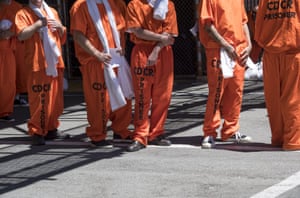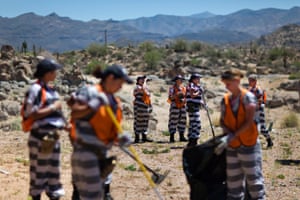I may be locked up in solitary confinement, but I stand with the men and women rejecting modern slavery in America
This week, a nationwide strike was launched across US prisons that has the potential to become the largest protest of incarcerated men and women in the history of this country.
It’s a move that is of personal interest to me, as I sit in my solitary cell in a maximum security prison in Virginia. I’ve been in touch with several of the strike organisers in other prisons, and though my communications are limited under the restrictions of my confinement, I’m doing all I can to open the American public’s eyes to the abuses that go on behind bars.
Until the strike ends on 9 September I will be joining a boycott of the commissary – I will not be parting with any money so that prison companies can make profit out of me. I’ll also be supporting fellow inmates here and across the nation who will be refusing to work in what amounts to a modern form of slavery.
On 10 July I was moved to Sussex state prison in Waverly, Virginia, and placed in a cell in death row. I have never been sentenced to the death penalty, so there can be only one reason they have put me here – to shut me up and prevent me fraternising with other prisoners as they fear I will radicalise them and encourage them to resist their oppression.
Three death row prisoners – the last in the state of Virginia – occupy cells near mine. The prison authorities have ordered them specifically not to talk to me, but I’m heartened that the other guys don’t seem minded to pay any attention to that injunction.
That’s been the pattern of my incarceration for the past many years. I resist, they retaliate.
I have always refused to perform labor inside prison, ever since I was convicted of murder in 1990 when I was 18 years old. (I have consistently challenged my conviction on grounds that I was subjected to a misidentification and am innocent.)
I see prison labor as slave labor that still exists in the United States in 2018. In fact, slavery never ended in this country.
At the end of the civil war in 1865 the 13th amendment of the US constitution was introduced. Under its terms, slavery was not abolished, it was merely reformed.

Anybody convicted of a crime after 1865 could be leased out by the state to private corporations who would extract their labor for little or no pay. In some ways that created worse conditions than under the days of slavery, as private corporations were under no obligation to care for their forced laborers – they provided no healthcare, nutritious food or clothing to the individuals they were exploiting.
Though I’ve always refused to engage in this modern slavery myself, I’ve witnessed plenty of examples of it. The most extreme were in Texas and Florida, where prisoners are forced to work in the fields for free, entirely unremunerated.
They are cajoled into chain gangs and taken out to the fields where they are made to grow all the food that inmates eat: squash, greens, peas, okra. They are given primitive hand-held tools like wooden sticks and hoes and forced to till the soil, plant and harvest cotton.
They are watched over all day by guards on horseback carrying shotguns. Elite posses of prisoners are used to keep other prisoners in line, through open coercion and violence.
Prisoners who do not agree to such abject slavery are put in solitary confinement. I know from personal experience.
Apart from six months when I was in general population in Oregon, I have been held in isolation cells without pause since 1994.
That hasn’t prevented me speaking out about the appalling conditions inside US prisons. I’ve helped other inmates file wrongful death lawsuits after prisoners were killed by guards. I’ve seen prisoners beaten by guards, starved, having their property systematically destroyed.
Racial animus is always present. The state that now incarcerates me, Virginia, has a general population that is 19% African American, but 58% of its prison population is black.

A few years ago I was held in Florida prisons at a time when current and former guards were found to be card-carrying members of the Ku Klux Klan. On a personal level, I’ve been called a “rebellious nigger” too many times to mention.
Because of my refusal to work, and the efforts I’ve made to organise strikes and publicise the horrors that go on behind bars, I have faced regular reprisals. In recent years I’ve been bounced around from state to state in an attempt to silence me: they sent me from Virginia to Oregon, from there to Texas and Florida, then back again to Virginia.
Now I’m on death row, even though I’m not a death row prisoner, which is about as total a condition of isolation you can get. Yet I still found a way to get this article to the Guardian.
Will I face reprisals for writing this column? Sure I will. Do I fear such reprisals? I am far past the point where threats concern me.
In the past three decades I have been endured every level of abuse they have to offer: I have been starved, beaten, dehydrated, put in freezing cold cells, attacked with attack dogs, rendered unconscious, chained to a wall for weeks. There’s nothing left to fear.
- Kevin Rashid Johnson is co-founder of the New African Black Panther Party. He is serving a life sentence
Since you’re here…
… we have a small favour to ask. More people are reading the Guardian than ever but advertising revenues across the media are falling fast. And unlike many news organisations, we haven’t put up a paywall – we want to keep our journalism as open as we can. So you can see why we need to ask for your help. The Guardian’s independent, investigative journalism takes a lot of time, money and hard work to produce. But we do it because we believe our perspective matters – because it might well be your perspective, too.
The Guardian is editorially independent, meaning we set our own agenda. Our journalism is free from commercial bias and not influenced by billionaire owners, politicians or shareholders. No one edits our Editor. No one steers our opinion. This is important because it enables us to give a voice to the voiceless, challenge the powerful and hold them to account. It’s what makes us different to so many others in the media, at a time when factual, honest reporting is critical.
If everyone who reads our reporting, who likes it, helps to support it, our future would be much more secure. For as little as $1, you can support the Guardian – and it only takes a minute. Thank you.
